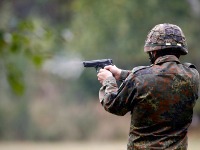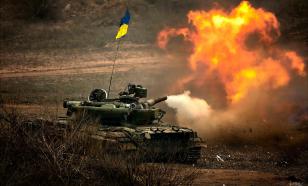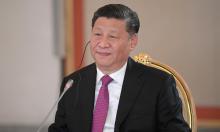Austria says no to professional army
Austria will not be creating a professional army. A recently held referendum confirmed that approximately 60 percent of voters believed in the necessity of preserving a regular army. What are the reasons behind the unwillingness to maintain a professional army?

Many developed world powers have already abandoned mandatory army recruitment, but not all countries support this initiative. Not that long ago Austria held a national referendum that discussed the possibility of creation of a professional army on a contract basis, but the majority of citizens did not support this proposal.
Over 60 percent of the population voted for preservation of the universal conscription, and only 40 percent voted for creation of a contract army. Defense Minister Norbert Darabos also voted in favor of creation of a professional army, however, based on the results of the referendum, the Social Democratic Party of Austria was defeated. The Austrian People's Party whose members were in favor of maintaining mandatory military service has won.
Many developed European nations have long switched to a professional army. For example, France abandoned regular army in 2006, and Germany - in 2011. Most of the Eurozone countries have armies on contract basis. The only exceptions are Turkey, Norway, Estonia, Greece and Denmark that are members of NATO.
The question of creating a professional army on a contractual basis was raised in 2010 during the election campaign. The proposal to hold a referendum on the issue was made by Mayor of Vienna Michael Häupl. At the time he was supported by such organizations as the Alliance for the Future of Austria and Team Stronach, however, the Austrian Freedom Party opposed the proposal. The idea was also opposed by the Austrian People's Party. However, in 2012 the People's Party leader Michael Spindelegger agreed that there was a need for a referendum.
In January of 2013 the referendum was held, attended by over 6 million citizens. All citizens over the age of 16 were allowed to vote. As of November 27, 2012, the number of registered voters was 0.37 percent higher than in the previous presidential election in Austria.
The initiator of the referendum was the Social Democratic Party of Austria, whose members believe that the country needs a modern professional army. In their view, contemporary modern conditions require a strong army that wins with professionalism, and not numbers. Such phenomena of the 21st century as cybercrime and terrorism cannot be stopped by an ordinary army composed of untrained recruits. In addition, representatives of the party argued that currently in the EU out of 27 members 21 had professional armies.
The opponent of the Social Democratic Party of Austria is the Austrian People's Party, whose members claimed that mandatory military service was a necessity. They believe that it is of great importance for the country's sovereignty and support of civil service. However, members of the People's Party said that the country's army was in need of certain reforms that would help recruits use their time as efficiently as possible.
According to the Minister of Defense Norbert Darabos, professional army is key to successful development of the country. According to him, the armed forces, formed on a voluntary contract basis, are more efficient, which is important in today's world. Members of the Social Democratic Party mentioned that many countries have long switched to a professional army.
The distribution of votes in the referendum was interesting. Most of the people under 30 (60 percent) voted for creation of a professional army, while older people voted against it. According to the Minister of Defense of Austria, this has to do with the fact that today's youth does not want to serve in the army, replacing service with easier alternatives. As Norbert Darabos explained in his speech, now young men subject to military service can choose whether they want to serve in the armed forces for six months, or dedicate nine months to the work in hospitals, nursing homes, boarding schools, etc. According to the Minister of Defense, the majority of recruits still choose "alternative service", and most of them voted for the introduction of a professional army.
In addition, the initiators of the idea of a contract army emphasize that this reform would help to reconcile Austria with NATO countries, and, ultimately, even lead to the complete abandonment of the neutrality of the country adopted in 1955. According to representatives of the Social Democratic Party of Austria, now the Austrian government is trying to minimize the country's participation in any military operations, and, in addition, the state is not a member of various military alliances. Not that long ago, Vienna officially refused to take part in the peacekeeping operation in Mali.
According to experts, citizens are skeptical of a possible rapprochement between Austria and NATO. In addition, according to the Social Democrats, many fear that the transition to a new military model would somehow affect the neutrality of the country.
Interior Minister Johanna Mikl-Leitner argued that one of the main reasons preventing creation of a professional army was high cost associated with maintenance of professional armed forces. Incidentally, now Austria is one of the European countries where the cost of the armed forces is very low. According to the Minister of Internal Affairs, the government cannot allocate that much money to maintain a contract army. The Social Democrats disagree. As noted by Norbert Darabos, the Ministry of National Defense planned to obtain additional funds through the sale of some military equipment.
In addition, Foreign Minister Michael Spindelegger said that at this time there were still possibilities of financing reforms, and the government has not yet exhausted the limit of the economy. According to him, first it is important to assess what kind of reforms is needed in the transition of the army on a contract basis, and only then talk about the increased spending.
Spindelegger was supported by Werner Fasslabend, former Minister of Defense. He believes that the government is well aware that creation and maintenance of a professional army is much more costly that maintenance of a regular army, however, the authorities have taken into account all possible costs and, if necessary, would be able to stay within the available budget.
Many citizens who voted for the preservation of the regular army said that transition to a contract army may lead to a shortage of the armed forces. However, Norbert Darabos disagreed, noting that this shortage already exists as many recruits replace military service with alternatives.
The Social Democrats think that there is more to it. Many Austrian citizens believe that the established order can protect the state from "malignant" influence of NATO, and the transition to a professional army is a step towards loss of independence and sovereignty.
However, according to analysts, many people who voted for the preservation of the regular army voted based on their emotions. They think that the Austrian People's Party campaign under the slogan "Army of the people for the people" had an effect on many citizens, touching their patriotic feelings. Even the active promotion of a professional army by the media did not yield positive results. Skeptical citizens felt that the state did not need to create a professional army. In any case, now the idea of the armed forces on a contract basis is no longer relevant, and analysts cannot say how soon this issue will be considered again.
Sergei Vasilenkov
Pravda.Ru
Subscribe to Pravda.Ru Telegram channel, Facebook, RSS!


